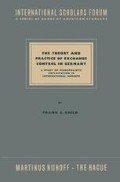Abstract
The Classical economist of the 19th century, with his faith in the ultimate efficiency and equity of free, impersonal markets, would certainly be amazed and dismayed by the developments in foreign exchange markets during the last thirty-five years. With the exception of the United States no important trading nation in the world of today maintains a freely convertible currency. On the contrary, each nation maintains a more or less comprehensive system of controls over the receipts and payments which can be effected in international markets.
Access this chapter
Tax calculation will be finalised at checkout
Purchases are for personal use only
Author information
Authors and Affiliations
Rights and permissions
Copyright information
© 1958 Martinus Nijhoff, The Hague, Netherlands
About this chapter
Cite this chapter
Child, F.C. (1958). Introduction. In: The Theory and Practice of Exchange Control in Germany. International Scholars Forum, vol 10. Springer, Dordrecht. https://doi.org/10.1007/978-94-015-5301-8_1
Download citation
DOI: https://doi.org/10.1007/978-94-015-5301-8_1
Publisher Name: Springer, Dordrecht
Print ISBN: 978-94-015-5298-1
Online ISBN: 978-94-015-5301-8
eBook Packages: Springer Book Archive

